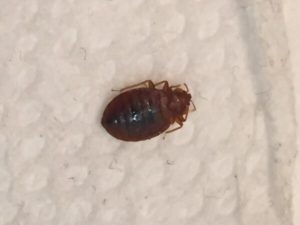Most people who learn they have bed bugs start by looking for quick fixes.
Bed bug mattress covers are frequently one of the first solutions people try when they want to get rid of a bed bug infestation. The logic is pretty obvious. If bed bugs live in the bed, surely covering up your mattresses in a thick, impermeable layer of sturdy outer fabric ought to do the trick!
But do bed bug mattress encasements work? Well, unfortunately, the answer isn’t neat or clear cut. In this article, we’ll look at bed bug biology, infestations, and why protective covers may be part of an infestation solution, but never a complete one.
Bed Bug Mattress Covers: What They Are, and How They’re Supposed to Work
Insect preventing bed mattress covers operate on a very basic principle. They encase the mattress in an impermeable barrier, preventing existing insects in a bed mattress from escaping while preventing new ones from setting up camp.
These bed mattress encasements are usually made of tough cotton or similar textile, with sturdy sealing mechanisms. Some variants only protect your bed mattress. Other bed mattress encasements encase both the bed mattress and its accompanying box spring.
Do They Actually Work?
Ah, the six million dollar question! To answer this accurately, we’re going to have to take a step back and talk about bed bug biology, and what your typical infestation looks like.
The term “bed bug” is a misnomer.
They don’t just live in beds. Nor do these resilient and resourceful critters confine themselves to your soft and padded furnishings. These diminutive insects are roughly the width of a fingernail, and they’re capable of successfully hiding throughout your home, from carpets to clothing to wooden furniture crevices.
Then there’s the pest’s prolific breeding cycle. An adult female will produce up to a dozen eggs each day. Moreover, a laying insect will instinctively move away from existing infestation sites. Infestations, therefore, spread incredibly quickly.
In almost every infestation we encounter, bed bugs have spread throughout several rooms of a home before homeowners are aware they have a problem. By then, they’re not just living in your bed.
So, back to the question at hand: Do protective bed mattress encasements kill bed bugs? No. At least not in a meaningful way. While a properly installed mattress cover will cause your unwanted visitors in that mattress to slowly starve to death, this does nothing to prevent bed bugs from infesting multiple rooms of your home.
How Long Does It Take to Kill Bed Bugs With a Bed Mattress Encasement?
Unfortunately, the outlook for bed mattress encasements as an infestation solution gets even worse. Entomologists frequently refer to bed bugs as “resilient,” but that word doesn’t quite cut it when we’re talking about the extreme survival smarts of Cimex lectularius.
Even though these insects will try to consume human blood at least once per week, if it loses access to nutrition, a bed bug won’t simply up and die — not by a long shot.
These resourceful pests will power down into a near dormant state; some studies suggest they can stay in stasis in your bed mattress for up to eighteen months. At any time in that year-and-a-half, if the slightest gap or tear presents itself as an opportunity — you guessed it — they will reappear, hungrier than ever.
Frequently Asked Questions About Bed Bug Mattress Protectors
So now you have the basic lay of the land with bed mattress encasements. To sum all the above up in a few words: a specialized mattress encasement will separate bed bugs in your mattress from a food source, but there is no proof they’re effective at killing these pests, nor will they resolve an infestation.
Here are a few questions customers frequently ask about bed bug mattress covers:
1. Will Bed Bug Mattress Encasements Stop Bed Bugs From Biting Me?
Bug bites can happen anywhere on the body and are one of the more traumatic aspects of an infestation.
The good news is that an insect prevention mattress encasement will stop bed bugs in your bed mattress from biting you. However, you’ll need to install it properly, ensure the zip is entirely closed, and regularly double-check that no tiny tears or perforations form.
And of course, you may still be bitten by those lurking elsewhere in your home.
2. Do Mattress Encasements Prevent Bed Bugs?
Here, sadly, the answer is a resounding no.
Remember, these prolific little survivors don’t exclusively inhabit beds. The creatures will happily live in your bedding covers, carpet, tiny fissures in your furniture, and any places your pets hang out (to name just a few of their familiar haunts).
3. Do Regular Mattress Protectors Work for Bed Bugs?
A specialized bed mattress encasement costs significantly more than regular household mattress encasements. It isn’t all that surprising then that people wonder if a regular mattress protector might do the trick.
Unfortunately, regular mattress protectors are completely useless against bed bugs. A regular mattress protector is not designed to protect every inch of a mattress, and it provides no protection whatsoever against insects finding and living within your mattress.
4. What About Bug Interceptors? Will They Help?
Good question! Interceptors are small dishes that you can install under conventional furniture legs, including some beds. They’re a low-tech way to prevent crawling insects from infesting furniture.
They definitely help.
Combined with mattress encasements, an interceptor will decrease the likelihood of your bed getting some unwelcome visitors, and they’re a cost-effective part of any solution. However, they only prevent incursion into specific items of furniture. They won’t completely prevent or resolve a house-wide infestation.
Here’s where you can learn more about bed bug treatment for other furniture.
5. What Kind of Bed Bug Mattress Encasement Should I Choose?
The golden rule is, buy quality. Any tear or minute gap in a bed mattress cover will render it useless. Make sure it completely encases your mattress, that it’s certified to be bed bug proof, and that online reviews are generally favorable.
If you can, carefully inspect a cover before purchase, paying particular attention to the stitching around zippers. If any aspect of the bed mattress encasement seems flimsy or unreliable, we suggest you pass. Testing one mattress before buying additional covers is also a sensible idea.
If in doubt, talk to a pest control expert near you. They’ll be able to recommend a quality product that is right for your bed, family, and home.
What’s the Solution?
Mattress encasements won’t protect your home from a typical bed bug infestation. So, what will?
Back to Biology
Let’s get back to biology. Bed bug mattress encasements aren’t particularly useful because they don’t hit a bed bug’s most significant vulnerabilities:
- Mattress covers work by separating a small portion of the bed bug colony from its food source (namely, and I’m sorry if this grosses you out, you!). We already know bed bugs can live within these covers for over a year without food.
- Moreover, all it takes for an infestation to rage out of control is one laying female. Remember, just one such critter can potentially produce up to 500 new bed bugs in its lifetime. Isolating bed bugs using mattress encasements does nothing about the bugs elsewhere in your home.
Heat is the Answer
Bed bugs have one fatal weakness. Heat.
If you expose a bed bug to heat higher than 120 degrees Fahrenheit, it’ll go legs-up instantly. It doesn’t matter where in your house the little critter is hiding, including your mattresses. If you can expose it to sufficient heat, it’ll die. It’s as simple as that.
While other solutions, such as mattress encasements, interceptors, and pesticide dust can all help aid with prevention, the proof is clear. The gold standard in completely eradicating these pests from your home is to blast them with sufficient heat to destroy them outright.
A heat treatment is quick, too! We can typically heat treat an entire home within one day.
No interminable waiting. No stress that your bed mattress protector isn’t working correctly. No grueling process of constant maintenance and upkeep of your mattress encasements.
Give us a Call
If you’d like to learn more about how heat treatment can end your bed bug problems, just talk to us. We’re your local Cincinnati bed bug extermination experts. We’ll help you choose the right approach for identifying, managing, and preventing infestations in your home.


